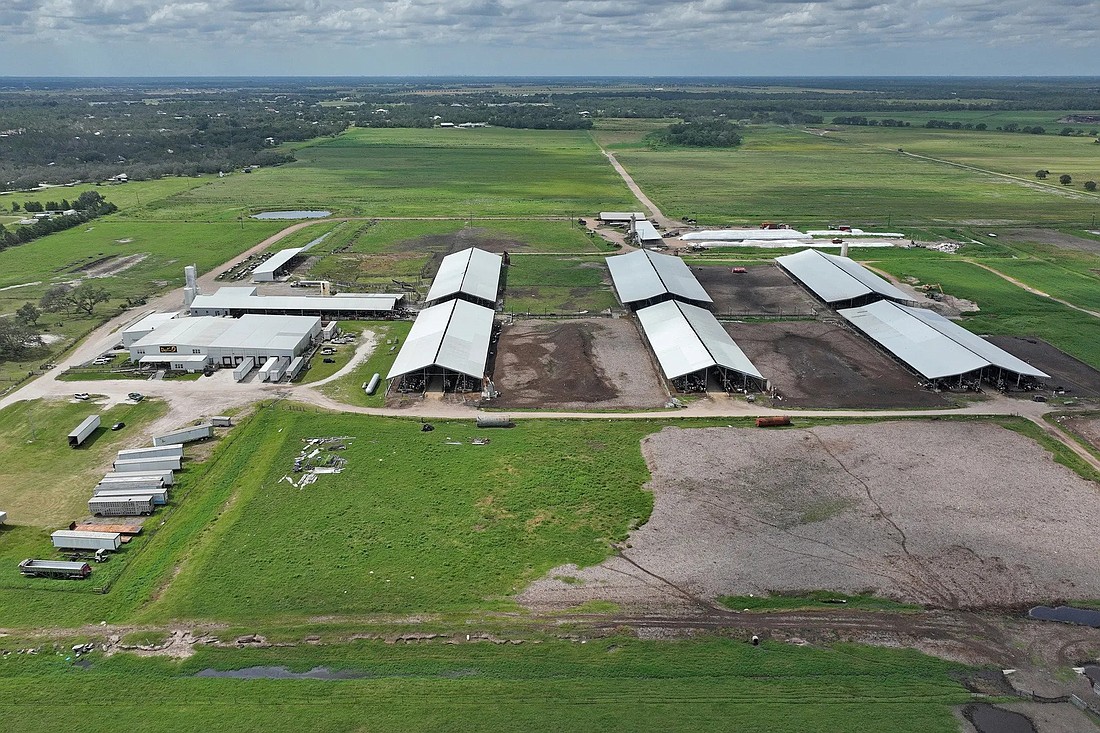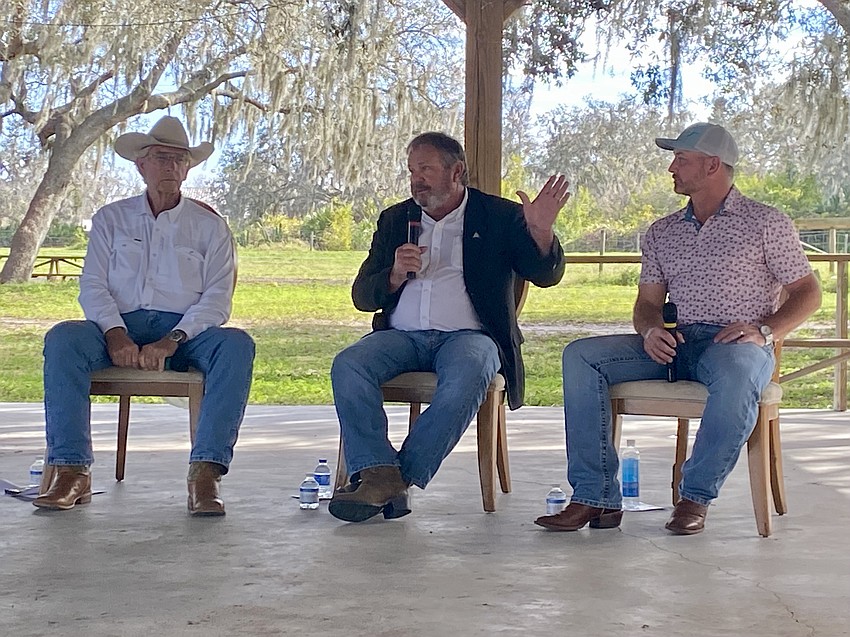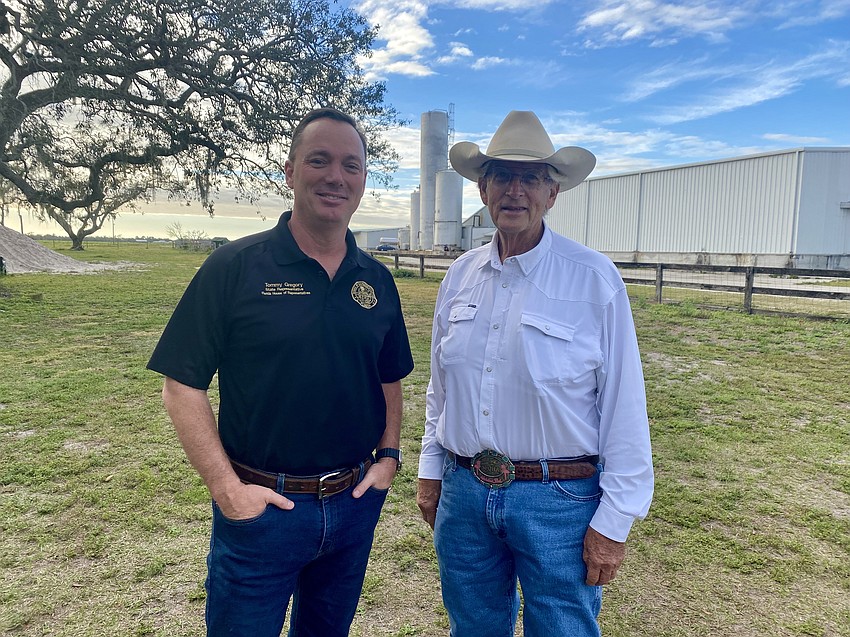- October 23, 2024
-
-
Loading

Loading

Despite a bleak forecast for agriculture in Manatee County, a panel of experts representing the industry's concerns came together Feb. 10 at Dakin Dairy Farms in Myakka to suggest actions that would counter urban sprawl.
The "Future of Agriculture in Manatee County" panelists were Myakka rancher Jim Strickland, Dakin Dairy Farm owner Jerry Dakin, Manatee County Farm Bureau President Gary Reeder, and Manatee County Cattlemen's Association President Luke Davis.
District 72 Rep. Tommy Gregory described the panelists as agricultural legends in the county.
The panel suggested county residents can slow down the destruction of agricultural land by voting for Manatee County Commission candidates who see the value in preserving agricultural land, by voting for legislation that preserves the land, by getting young people involved in agriculture through programs such as 4-H, and by purchasing products from local farmers while asking grocers to stock local products.
Strickland noted to more than 100 people in attendance that Manatee County ranchers have contributed to the growing problem by selling to developers.
“We’re to blame because every single house, and road, and supermarket used to be a cattle ranch,” said Strickland, whose holdings include Strickland Ranch.
He said the purpose of the "Future of Agriculture in Manatee County" was to draw more awareness to disappearing agricultural land and to further educate the public about the situation.
Charlene Kow traveled to hear the panel because she lives near the up-and-coming Lake Flores community in west Bradenton and she wants to see the end of overdevelopment in Manatee County.
“We’ve lost that nice, little tomato farm out there for what’s going to be urban sprawl,” she said. “Urban sprawl out (east) is a big problem, too, because as they push the development boundaries, now the county is committed to providing services for these people.”
Lake Flores bills itself as a walkable neighborhood of 6,500 homes on 1,000-plus acres of land that borders the IMG Academy. It's been owned by the same family since 1892. Whiting Preston is the fourth generation heir and also the developer.
Strickland said there are two reasons farmers and ranchers sell critical land. One is money, and the other is because their heirs don't want to be ranchers or farmers. He said those heirs might not want to go into agriculture because it requires long, hard hours. And he said some farmers and ranchers are forced out of their industry because they simply can’t afford to farm anymore.

When moderator Katie Close asked how much impact county commissioners have on agricultural land, Davis turned to the only commissioner in the crowd, George Kruse. His answer was simply “a lot.”
Commissioners decide which, and if, lands are rezoned. Kruse was the sole vote against Carlos Beruff’s East River Ranch that will build over 5,000 homes east of the Future Area Development Boundary.
“I’ve tried to get 2.1.2.8 (which allows, in certain cases, for development east of the FDAB) out of our Comprehensive Plan, which I think would have a meaningful impact,” Kruse said. “To be fair, that would have a negative impact on people like Jerry (Dakin) because they couldn’t market this as a development.”
Dakin is selling his dairy farm, but he is hoping to sell to a buyer who will maintain the land’s agricultural zoning.
“The people who are looking at my place are in New York,” Dakin said. “They have big farms and they’re wanting to expand, so they’re looking to come down here.”
He said that while the eventual buyer might not be from Manatee County, the buyer would be from the United States, and would continue to farm the land.
Other ranchers and farmers aren't as committed to Dakin’s dedication, especially when the offers from developers can be significantly higher. Developers know most current county commissioners are keen on development, so the likelihood of received required zoning changes is good.
“All the properties around here, you’ll notice they all say ‘development opportunity,’” Myakka City resident Kim Seery said. “They think they’re going to get the permitting and build.”
That's for a good reason.
District 5 Commissioner Ray Turner said the county is dealing with a "population explosion."
"My question to everybody is, 'Where do we go?'" he said. "It's east or infills, and neither one is popular."
Lake Flores is an example of an infill development because everything around it is already built up.
District 1 Commissioner James Satcher has Parrish and Myakka in his district, and he lives in Parrish, where homes are being built by the thousands. The Lazy C. Ranch is one more large parcel that has been sold recently. On Jan. 18, commissioners passed a Comprehensive Plan amendment to allow for 1,100 homes on 404 acres that were previously zoned for agriculture.
Satcher equates the situation in Parrish to baby boomers coming home after the Second World War to start families.
"That's what's happening in my part of the county," he said. "People are starting their lives and they need the bedrooms, and they need a place they can work, as well, so Bradenton, Sarasota and Tampa offer those jobs, and North River and Parrish offer the square footage and the right feel to where people enjoy raising their families here."
Lakewood Ranch was like Parrish as it was mostly agricultural land. Now it is the best-selling, multi-generational, master-planned community in the country.
Panel members stressed that a decline in agriculture is not just a Manatee County problem but a national issue in which Florida plays a major role.
Reeder said much of the country depends on Florida for fresh vegetables in the winter. So what happens if there’s no land left to farm on?
“We’re going to become slaves to somebody else,” Davis said. “That’s where we’re headed. Overdevelopment is going to attack us at our root core.”
He said when food comes from other countries, whatever happens in those countries, whether it be a war or a natural disaster, the conditions impact Americans.
Since taking office in January 2023, Florida’s Commissioner of Agriculture Wilton Simpson has made the argument that agriculture is a matter of national security.
He’s stated that through recessions and the COVID-19 pandemic, agriculture has been the driving force of Florida’s economy. Overall, its $180 billion impact is only second to tourism, and it supplies more than 2 million jobs.
When Simpson gives speeches, he often asks the crowd to imagine one week without food. He says only a week of empty grocery stores would cause chaos, but 30 weeks would cause deaths from starvation.
The panelists stressed that programs like the Rural and Family Lands Protection Program offer agricultural easements to farmers.
Easements allow farmers to maintain their operations and receive tax benefits. In exchange, the state buys the future development rights and limits non-agricultural uses.
Locally, Manatee County has the Environmental Lands Management and Acquisition Committee that allows for the purchase of agricultural easements.

“The last study that was done in Manatee County showed that for every dollar agricultural land contributed into the county coffers, it only took about 60 cents to service those people,” Strickland said. “Basically, agriculture was helping to subsidize everybody in town.”
Out of 22 projects on Manatee County's Environmental Lands Management and Acquisition committee dashboard, only two are classified as agricultural easements and both have been ruled out.
The only property the county has purchased through ELMAC is Crooked River Ranch, which will eventually offer the public a new preserve to enjoy. But no other ranch lands are on the horizon.
Ranchers can be drawn to agricultural easements that don't have to allow for public access, but the public benefits in other ways.
Davis grew up in Pinellas County riding dirt bikes through orange groves that no longer exist.
“They can’t bring it back,” he said. “That’s what I’m fighting for here in Manatee County. You can save it, and you can preserve it.”
Pinellas County has moved away from preserving agricultural lands. In the last United States Department of Agriculture census from 2017, which is due to be updated this year, a stark contrast is shown between the market value of agricultural products sold out of each county.
Manatee ranked fourth with a value of $360 million, and Pinellas ranked second to last with a value of $1 million. Size accounts for some distance between the two numbers because Manatee is more than twice the geographical size of Pinellas, but a $359 million difference offers a hint as to what could be lost.
"Agriculture is important for economic development. It's not taken lightly," Turner said. "Because we're pushing east doesn't mean we don't care about it."
Out of 572,000 total acres, Manatee County has 220,000 acres of agricultural land left.